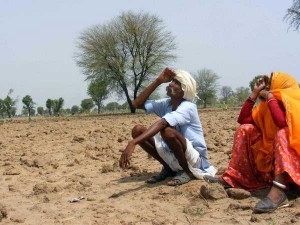Maharashtra records the highest number of farmers’ suicides in 2014 with,2568 cases. The state recorded the highest number. An otherwise rich and advanced state with a poor rural development record, right?
 Then comes Chhattisgarh with 443 cases, then, Telengana and Madhya Pradesh.
Then comes Chhattisgarh with 443 cases, then, Telengana and Madhya Pradesh.
Yes, the reports on the farmers’ suicides don’t subside!
You open a Sunday newspaper and what do you want to study on a leisurely morning?
A half page a dense writing on what? 50 suicides in 15 days and the subheading goes into the standard lament: is it falling prices? Or, decliing yields or aspirational spending and getting into debts or other sociological pressures?
And then a monotonous narration of events and happenings in a series of villages!
Where are the leaders, the ministers and the chief minister? Officials? No there is no news. Nor about what the sugar mills are doing? No news and there is no indept reporting even in the quality media. What about the TV news channels? They have no time or patience to report such heavy and even boring news.
At best same sensational pictures of people in distress. And by the way who has the time or even interest in such topics like rural India’s distress. Now, Karnataka, of all the states has come to the fore and there is every day suicides happening in the otherwise thought to be a forward looking state.
The old stories of India’ Silicon Valley is now pushed to the inside pages and why, even the farmers suicides after so many days of repeated reporting is pushed inside the pages.
This is all about farmers’ distress. What about the sugar mills whose expansion is still on the upswing. As per the latest reports, again emanating from Karnataka, there is going to be a new set of 40 odd new sugar mills proposed in the North Karnataka. That shows there is still a market for new mills.
Then, what about the defaulting mills? Any punitive action? What about the orders to seize the sugar stocks and sell in the open auction? No news? No follow-up? Or succumbing to the sugar lobby that cuts across the party lines?
No one asks and certainly no one is prepared to antagonise any lobby or vote bank.
The Economic Times wrote an editorial on the nexus between the erring sugar mills with heavy debts and the party funding process that had, says the ET editorial, led to the present accumulating of PSU debts.
Only in recent times, we see a change in the government approach to shedding the heavy accumulating PSU bank debts. One b y one we see the corporate heavyweights are caught in the judicial net of the apex court and one is put inside the bar, another is fined for abusing the process of law and even one or two others are asked to submit to regulations.
Of course, the erring heavyweights, in other areas be it cricket or spectrum allocation or even the allocation of coal blocks, one by one is being pushed to come clean in the bar of public perception.
So, the economic growth pangs, the economic growth imbalances, the asset stripping, we saw in the former ex-Communist regimes, are also seen in a not dissimilar fashion.
When the state becomes irresponsible and tweaks the process of law, why even when the process of governance becomes weak or soft, as we had noticed under the previous regime then, a situation we reach as we have done ,in our opinion, where we see the large scale distress in the countryside, the weaker sections are hit hard.
Is there any doubt that the farmers are the weaker sections today? A section that has no voice?
The media is plainly disinterested and the TV channels plainly are not caring either.
So, how the farmers’ voice, if not the farmers ‘lobby is to be taken seriously. In India the rural India is badly distorted for various reasons, some historical, the Gandhian legacy had left the Indian countryside romanticised but badly neglected in terms of development priorities.
There is simply no decentralisation of powers. In most states, there is no panchayat raj, the district collector is still the boss. Under him ,the entire rural administration, from Tahsildar office to other departments are still functioning like the colonial arm of the government.
In the lower levels corruption is a way of life. Those of us who have rural links, owning landed property, keep living are the worst hit. Land ownership itself is nebulous.
Owning agricultural land is now a curse.
So too the access to many other modern services like agricultural credit, water, power and many other things. Sanitation is a scandal in most parts of even advanced states like TN, you know?
As per the latest socio-economic caste census 2011,casual manual labour is still very high(in Karnataka alone it is 32.49%) and the urban newspapers report the landlessness is the cause for poverty! Sheer nonsense!
Every rural hand cant own land, right?
Owning land is a socio-cultural and other force. Only one or two households can own, retain agricultural lands. This needs a critical sociological study. M.N.Srinivas, the famed sociologist, has written about the “dominant caste”. We urge the readers to study these phenomena.
Please don’t follow the urban, arm chair experts. Go into the villages and then you will find the rural reality is otherwise. A realistic public policy for Indian agriculture is called for.
Vadamalai Media is in this task for the quarter of a century, please note. Deal with the erring sugar mills ruthlessly. Dont succumb to vote bank politics. Recover the mills’ debts first, then come to sugarcane suppliers!
It is vote bank politics that had led to the present sugar crisis.
It is for the Prime Minister to take a call!